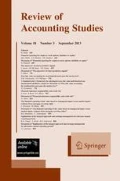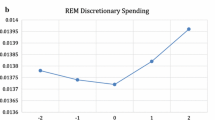Abstract
We find evidence that initial public offering (IPO) firms, on average, have high positive issue-year earnings and abnormal accruals, followed by poor long-run earnings and negative abnormal accruals. The IPO-year abnormal, and not expected, accruals explain the cross-sectional variation in post-issue earnings and stock returns. The results are robust with respect to alternative abnormal accruals and earnings performance measures. IPO firms adopt more income-increasing depreciation policies when they deviate from similar prior performance same industry non-issuers, and they provide significantly less for uncollectible accounts receivable than their matched non-issuers. The results taken together suggest opportunistic earnings management partially explains the new issues anomaly.
Similar content being viewed by others
References
Aharony, Joseph, Chan-Jane Lin, and Martin Loeb. (1993). “Initial Public Offerings, Accounting Choices, and Earnings Management.” Contemporary Accounting Research 10, 61–81.
Beneish, Messod. (1994). “The Detection of Earnings Manipulation.” Working paper, Duke University.
____. (1995). “Why Do Managers Overstate Earnings?” Working paper, Duke University.
____. (1997). “Detecting GAAP Violation: Implications for Assessing Earnings Management among Firms with Extreme Financial Performance.” Journal of Accounting and Public Policy 16, 271–309.
Bowen, Robert, David Burghstahler, and Lane Daley. (1986). “Empirical Evidence on the Relationship between Earnings, Cash Flow, and Cash Flow Surrogates.” The Accounting Review 61, 713–725.
Cheng, Li-Lan. (1995). “Equity Issue Underperformance and the Timing of Security Issues.” Working paper, Massachusetts Institute of Technology.
Choi, Won, Jeffrey Gramlich, and Jacob Thomas. (1993). “Earnings Management in Response to the Book Income Adjustment of the Corporate Alternative Minimum Tax.” Working paper, Columbia University.
DeAngelo, Linda. (1986). “Accounting Numbers as Market Valuation Substitutes: A Study of Management Buyouts of Public Shareholders.” Accounting Review 66, 400–420.
____. (1990). “Equity Valuation and Corporate Control.” Accounting Review 65, 93–112.
Dechow, Patricia. (1994). “Accounting Earnings and Cash Flows as Measures of Firm Performance: The Role of Accounting Accruals.” Journal of Accounting and Economics 17, 3–42.
Dechow, Patricia, Richard Sloan, and Amy Sweeney. (1995). “Detecting Earnings Management.” The Accounting Review 70, 193–225.
DeFond, Mark, and James Jiambalvo. (1994). “Debt Covenant Violation and Manipulation of Accruals.” Journal of Accounting and Economics 17, 145–176.
Friedlan, John. (1994). “Accounting Choices by Issuers of Initial Public Offerings.” Contemporary Accounting Research 11, 1–31.
Gaver, Jennifer, Kenneth Gaver, and Jeffrey Austin. (1995). “Additional Evidence on the Association between Income Management and Earnings-based Bonus Plans.” Journal of Accounting and Economics 19, 3–28.
Guay, Wayne, S. P. Kothari, and Ross Watts. (1996). “A Market-based Evaluation of Abnormal Accrual Models.” Journal of Accounting Research Supplement 34, 83–105.
Guenther, David. (1994). “Earnings Management in Response to Corporate Tax Rate Changes: Evidence from the 1986 Tax Reform Act.” Accounting Review 69, 230–243.
Hand, John. (1989). “Did Firms Undertake Debt-equity Swaps for an Accounting Paper Profit or True Financial Gain?” The Accounting Review 64, 587–623.
Hanley, Kathleen, A. Kumar, and Paul Seguin. (1993). “Price Stabilization in the Market for New Issues.” Journal of Financial Economics 34, 177–197.
Healy, Paul. (1985). “The Effect of Bonus Schemes on Accounting Choices.” Journal of Accounting and Economics 7, 85–107.
____. (1996). “Discussion of a Market-based Evaluation of Discretionary Accrual Models.” Journal of Accounting Research Supplement 34, 107–115.
Holthausen, Robert, David Larcker, and Richard Sloan. (1995). “Annual Bonus Schemes and the Manipulation of Earnings.” Journal of Accounting and Economics 19, 29–74.
Jones, Jennifer. (1991). “Earnings Management during Import Relief Investigation.” Journal of Accounting Research 29–2, 193–228.
Kaplan, Robert. (1985). “Comments on Paul Healy: Evidence on the Effect of Bonus Schemes on Accounting Procedure and Accrual Decisions.” Journal of Accounting and Economics 7, 109–113.
Kreutzfeldt, R., and Wanda Wallace. (1986). “Error Characteristics in Audit Populations: Their Profile and Relationship to Environmental Factors.” Auditing: A Journal of Practice and Theory 6, 20–43.
Liberty, Susan, and Jerold Zimmerman. (1986). “Labor Union Contract Negotiations and Accounting Choices.” Accounting Review 61, 692–712.
Loughran, Timothy, and Jay Ritter. (1995). “The New Issues Puzzle.” Journal of Finance 50, 23–52.
McNichols, Maureen, and Peter Wilson. (1988). “Evidence of Earnings Management from the Provision of Bad Debts.” Journal of Accounting Research Supplement 26, 1–31.
Moyer, Susan. (1990). “Capital Adequacy Ratio Regulations and Accounting Choices in Commercial Banks.” Journal of Accounting and Economics 13, 123–154.
Narayanan, M. P. (1985). “Managerial Incentives for Short-term Results.” The Journal of Finance 60, 1469–1484.
Neill, John, Susan Pourciau, and Thomas Schaefer. (1995). “Accounting Method Choice and IPO Valuation.” Accounting Horizons 9–3, 68–80.
Perry, Susan, and Thomas Williams. (1994). “Earnings Management Preceding Management Buyout Offers.” Journal of Accounting and Economics 18, 157–180.
Pourciau, Susan. (1993). “Earnings Management and Non-routine Executive Changes.” Journal of Accounting and Economics 16, 150–180.
Rao, Gita. (1993). “The Relation between Stock Returns and Earnings: A Study of Newly-Public Firms.” Working paper, Kidder Peabody and Company.
Ritter, Jay. (1991). “The Long-Run Performance of Initial Public Offerings.” Journal of Finance 66, 3–27.
Stein, Jeremy. (1989). “Efficient Capital Markets, Inefficient Firms: A Model of Myopic Corporate Behavior.” Quarterly Journal of Economics, 655–669.
Subramanyam, K. R. (1996). “The Pricing of Abnormal Accruals.” Journal of Accounting and Economics 22, 249–281.
Teoh, Siew Hong, Ivo Welch, and T. J. Wong. (1998a). “Earnings Management and the Long-term Underperformance of Initial Public Stock Offerings.” Journal of Finance 53, 1935–1974.
____. (1998b). “Earnings Management and the Post-Issue Underperformance of Seasoned Equity Offerings.” Journal of Financial Economics 50, 63–99.
Teoh, Siew Hong, and T. J. Wong. (1998). “Analysts' Credulity about Reported Earnings and Overoptimism in New Equity Issues.” Review of Financial Studies, forthcoming.
Author information
Authors and Affiliations
Rights and permissions
About this article
Cite this article
Teoh, S.H., Wong, T.J. & Rao, G.R. Are Accruals during Initial Public Offerings Opportunistic?. Review of Accounting Studies 3, 175–208 (1998). https://doi.org/10.1023/A:1009688619882
Issue Date:
DOI: https://doi.org/10.1023/A:1009688619882




